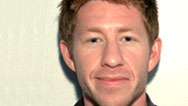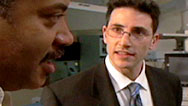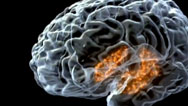Sleep
- Posted 07.10.07
- NOVA scienceNOW
(This video is no longer available for streaming.) We spend about one-third of our lives sleeping. Why? Believe it or not, scientists don't know for sure. But evidence is building that sleep may play a crucial role in strengthening memories and facilitating learning, not just in humans but in most animals.
NOVA scienceNOW visits research labs at the University of Pennsylvania and MIT, where scientists are peering into the brains of dozing flies and rats to understand the connection between sleep and memory. At Harvard Medical School, host Neil deGrasse Tyson tests his powers of learning on a virtual ski machine and a speed typing exercise, and then catches some z's. He discovers that it's not practice that makes perfect, but practice plus a good night's sleep.
Transcript
SLEEP
PBS Airdate: July 10, 2007
NEIL DEGRASSE TYSON: Hello. I'm Neil deGrasse Tyson, your host for NOVA scienceNOW.
We all know that dreams can be, dreams can be a little weird, sometimes filled with bizarre events that would never happen in real life. Nobody really knows why we dream. In fact, nobody really knows why we sleep.
Here are some folks who are trying to figure it out.
Amita Sehgal likes her flies, fruit flies, to be precise.
AMITA SEHGAL (University of Pennsylvania and Howard Hughes Medical Institute): I do have a genuine affection for them.
NEIL DEGRASSE TYSON: But sometimes, she has a strange way of showing that affection—especially, when she puts them into this thing.
AMITA SEHGAL: We use this piece of equipment we call "The Deprivator."
NEIL DEGRASSE TYSON: The Deprivator? It's like riding a roller coaster during an earthquake.
What's interesting to Sehgal is what the flies do after spending a whole night in here. The flies on the left were undisturbed last night, and they look fine. But the flies on the right, they were jostled all night long in the Deprivator. Now, some of them look dead, but they're not. According to Sehgal, they're catching up on lost sleep.
AMITA SEHGAL: If we keep flies awake at night, they need to make up for the sleep they have lost, and so will sleep in the morning, at a time when they're normally active.
NEIL DEGRASSE TYSON: But why would flies need to sleep? Could it be for the same reason we need to sleep? Maybe. But if you ask an expert what exactly that reason is...
MATTHEW P. WALKER (Harvard Medical School): We actually know very little about what sleep is doing for the brain.
AMITA SEHGAL: We spend a third of our lives sleeping. If you don't sleep, you die.
MATT WILSON: Sleep is an enigma. What is its purpose? That's something that we do not understand.
NEIL DEGRASSE TYSON: Looks like a waste of time. But then why would so many creatures do it?
MATT WILSON: Sleep is something that, the more we look at it, the more we see that it is fundamental. It's fundamental to essentially all organisms.
NEIL DEGRASSE TYSON: Including, it seems, organisms like fruit flies. When they're not being knocked around all night, Amita Sehgal's flies follow a pretty familiar schedule.
AMITA SEHGAL: They're active during the day and they sleep at night, for the most part, although there is an afternoon siesta as well, especially in males.
NEIL DEGRASSE TYSON: Trying to pinpoint the reason for a fly to snooze up to 12 hours a night, Sehgal's lab studies the fruit fly's brain.
AMITA SEHGAL: What we were doing was trying to figure out which part of the fly brain was important for sleep.
NEIL DEGRASSE TYSON: Sehgal's experiments pointed to the mushroom body, a part of the brain found in creatures like insects and spiders, but not in humans. Biologists have known about the mushroom body for years, but they associated it, not with sleep, but with something else entirely, an insect's memory.
AMITA SEHGAL: There is, then, this structure in the fly brain, which we already knew was required for memory, and we now find that it controls sleep.
NEIL DEGRASSE TYSON: The finding's intriguing because, for a long time now, sleep researchers have been debating a possible connection between sleep and memory.
Bob Stickgold has been looking into this possibility, sometimes in unconventional ways. For him, video games are research tools that can help reveal how our brains learn.
ROBERT STICKGOLD: Do you remember when you first started playing Tetris®...
NEIL DEGRASSE TYSON: Oh, yeah.
ROBERT STICKGOLD: ...that you went to bed at night, and you lay in bed, and you closed your eyes, and you saw little Tetris pieces floating around in front of your eyes?
NEIL DEGRASSE TYSON: How did you know that? How did you know that...
ROBERT STICKGOLD: Because...
NEIL DEGRASSE TYSON: ...I dreamed Tetris shapes?
ROBERT STICKGOLD: ...because everybody does.
NEIL DEGRASSE TYSON: After taking a few rides on a ski machine, Stickgold's research subjects fall asleep, and then he promptly wakes them up.
ROBERT STICKGOLD: If we wake you up just two or three minutes after you fall asleep and ask you, "Neil, what's going through your mind?" You'll say, "Seeing those suckers somersaulting down when I crash."
NEIL DEGRASSE TYSON: And why would I dream of this embarrassing moment?
Stickgold is convinced that while you sleep, your brain is reviewing what you've learned and strengthening your memories.
ROBERT STICKGOLD: The brain is being modified while we sleep, so that when we wake up in the morning, in some way, we have a different brain. And it's a brain that functions better.
NEIL DEGRASSE TYSON: At least it seems to function better on some kinds of memory tasks. Recent studies show that after a single night's sleep, sometimes even after a nap, we can do a better job recognizing visual patterns and even solving some math puzzles.
MATTHEW WALKER: What we're going to have you do is try and type out a short, five-digit sequence.
NEIL DEGRASSE TYSON: I saw it first hand when I took a simple typing test, typing a string of five numbers over and over again as fast as I could.
After a night's sleep, I could suddenly type the numbers faster and more accurately. And research backs this up. Most people improved their typing by about 20 percent after sleep.
MATTHEW WALKER: Practice doesn't make perfect. It seems to be practice with a night of sleep that makes perfect. Sleep is enhancing that memory so that when you come back the next day you're even better than where you were the day before.
NEIL DEGRASSE TYSON: But exactly how could sleep enhance your memory? We don't know. But possible clues have been showing up, not just in the brains of flies, but in the dreams of rats.
MIT researcher Matt Wilson says he can read rats' minds, including their dreams, with tiny electric probes.
MATT WILSON: What it means is that we're able to, at any time, plug in our electronics, and...
NEIL DEGRASSE TYSON: Figure out what they're thinking.
MATT WILSON: ...read their, read their mind.
NEIL DEGRASSE TYSON: Wilson's mind-readers are actually thin wires, about a tenth of the width of a human hair, that pick up the electrical signals among dozens of brain cells.
The wires—painlessly implanted in the rat's brain, and held there by a kind of hat—carry the signals right into Wilson's computers.
That information comes up back through these connectors into your computer, and you're sitting there watching a map of the thoughts of this rat?
MATT WILSON: Exactly. That's exactly right.
NEIL DEGRASSE TYSON: It's remarkable.
Wilson is most interested in mapping the rat's thoughts in a part of its brain called the hippocampus. Like the fruit fly's mushroom body, the hippocampus of a rat or a human plays an important role in memory, including our sense of space and location.
Wilson uses a specially designed rat maze. If the rat follows the right route, he's rewarded with some chocolate syrup. And as he moves through each different spot in the maze in search of his goal, a unique pattern of cells fires in his brain.
MATT WILSON: So we can tell where the animal is, simply based upon which cells in the hippocampus are active. That pattern will be unique for a given location in a given environment.
NEIL DEGRASSE TYSON: What's amazing is that the same patterns turn up again, even after the rat drifts off to sleep.
That's right, Wilson eavesdrops on his rats' dreams. And they aren't about cheese, they're about running the maze.
MATT WILSON: So when the animals would go to sleep, we would see these patterns of brain activity that were expressed while the animals were running on the maze, being replayed, in the same sequence, the same order in which they had been experienced.
NEIL DEGRASSE TYSON: But the replay wasn't exactly the same as when the rat ran the maze. Sometimes it was like an extreme fast-forward; quick flashes of the experience.
MATT WILSON: Now, at the time, you never know what is going to be important and what is not important. So you may re-evaluate or edit those memories to identify the things that were important.
NEIL DEGRASSE TYSON: And this fragmented replay wasn't just happening in the hippocampus. Wilson also detected it in the visual cortex, meaning the rats were likely seeing the maze in their sleep.
What's more, the visual cortex is part of the larger neocortex, which, in humans, is responsible for, among other things, long-term memory.
MATTHEW WALKER: The hippocampus is replaying the events of the day. The hippocampus is almost, sort of, reactivating the memories at night and playing them out to the neocortex. It's almost as though the hippocampus is having a therapy session with the, with the neocortex. And it's almost saying, "Okay, here's what we learned during the day."
MATT WILSON: What are rats and what are people doing during sleep? They are processing memory. They are replaying memory. Now, we could ask, "Is this about learning?" And I believe that's exactly what it is about, that animals are, and humans are trying to learn from past experience.
NEIL DEGRASSE TYSON: So, the idea here is that the sleeping brain might be reviewing and strengthening new memories it wants to hold on to for the long-term. And it might identify certain goals we want to work towards. Some believe the sleeping brain could lead us to real insights.
ROBERT STICKGOLD: We all know about "sleeping on a problem." And sleeping on a problem is when you have a lot of new information and don't know what to do with it, and you can't decide how to interpret it. And so you say, "Let me sleep on it." And, with remarkable success rates, you can wake up the next morning and have an answer to a problem that you couldn't find the answer to the night before. And that's all about processing information, processing memories in the brain.
NEIL DEGRASSE TYSON: So could it be that sleeping on it isn't just an old saying but a biological process that consolidates and organizes important information?
MATT WILSON: These are pretty big concepts. And they certainly are controversial. The function of sleep, as it relates to learning and memory, that's something that, at this point, remains speculation. We're making a leap.
NEIL DEGRASSE TYSON: Not everybody is leaping into bed with this idea. And researchers have a long way to go before they know what sleep is really doing for our brains. But if the speculation turns out to be true, then you'd have to wonder, "What is our 24/7 culture doing to our ability to think straight?"
MATTHEW WALKER: Sleep is not just something that we can choose to sort of dabble in every now and again. It's not a luxury; it's a biological necessity.
MATT WILSON: My sense is that disruption of sleep is much deeper than simply, you know, robbing us of rest. My guess would be that we lose the opportunity to gain understanding, a deep understanding of our past experience, that what we sacrifice, in a sense, is wisdom.
Credits
Sleep
- Edited by
- Dick Bartlett
- Written, Produced and Directed by
- Julia Cort
NOVA scienceNOW
- Executive Producer
- Samuel Fine
- Executive Editor
- Neil deGrasse Tyson
- Senior Series Producer
- Vincent Liota
- Supervising Producer
- Stephen Sweigart
- Editorial Producer
- Julia Cort
- Development Producer
- Vinita Mehta
- Senior Editor
- David Chmura
- Post Production Supervisor
- Win Rosenfeld
- Unit Manager
- Candace White
- Associate Producers
- Sarah Kinsella
- Anthony Manupelli
- Shimona Shahi
- Production Assistant
- Alison Snyder
- Production Secretary
- Fran Laks
- Animator
- Brian Edgerton
- Compositor
- Yunsik Noh
- Camera
- James Ball
- Mike Coles
- Mark Daniels
- Brian Dowley
- Bill McMillan
- Clive North
- Sound Recordists
- John Cameron
- Nicolas Dalban
- Paul Flinton
- Bill Heinlein
- George Hitchins
- Kevin Meredith
- Keith Rodgerson
- Ted Roth
- Josh Tallo
- Audio Mix
- Jim Sullivan
- Colorist
- Jim Ferguson
- Animation
- Vincent Liota
- Steve Popplewell
- Additional editing for CERN segment
- Paul Dawe
- Kevin Hanna
- Music
- Rob Morsberger
- Production Manager for CERN Segment
- Selina Kay
- NOVA scienceNOW series animation
- Edgeworx
- Three dimensional brain animation
- Courtesy Dr. Arthur W. Toga, Laboratory of Neuro Imaging at UCLA.
- Archival Material
- Bettmann/CORBIS
- Eric Bailey, Copyright, 2005, Los Angeles Times. Reprinted with permission.
- The Leonard Bernstein Office, Inc.
- Devaki Bhaya, Carnegie Institution
- California Historical Society, FN-25345
- California State Parks, Sutter's Fort Archives
- CERN
- CORBIS
- Denver Public Library, Western History Collection, Z-8843
- IBM Corporate Archives
- Library of Congress
- Steve Mitchell, emedia
- New York Philharmonic
- Courtesy Oregon Parks and Recreation Department, 2006
- Oxford Scientific (OSF)
- Torleif Svensson/CORBIS
- Truckee Donner Historical Society
- Vancouver Public Library, Special Collections
- Special Thanks
- CERN
- David Deamer
- Marco Antonio Delgado Mayordomo
- Alison North - The Rockefeller University Bio-Imaging Resource Center
- Neil deGrasse Tyson
- is director of the Hayden Planetarium in the Rose Center for Earth and Space at the American Museum of Natural History.
- NOVA Series Graphics
- yU + co.
- NOVA Theme Music
- Walter Werzowa
- John Luker
- Musikvergnuegen, Inc.
- Additional NOVA Theme Music
- Ray Loring
- Post Production Online Facility
- The OutPost
- Closed Captioning
- The Caption Center
- NOVA Administrator
- Ashley King
- Publicity
- Eileen Campion
- Anna Lowi
- Yumi Huh
- Lindsay de la Rigaudiere
- Researcher
- Gaia Remerowski
- Production Coordinator
- Linda Callahan
- Unit Manager
- Carla Raimer
- Paralegal
- Raphael Nemes
- Talent Relations
- Scott Kardel, Esq.
- Janice Flood
- Legal Counsel
- Susan Rosen Shishko
- Assistant Editor
- Alex Kreuter
- Associate Producer, Post Production
- Patrick Carey
- Post Production Supervisor
- Regina O'Toole
- Post Production Editor
- Rebecca Nieto
- Post Production Manager
- Nathan Gunner
- Business Manager
- Joseph P. Tracy
- Producers, Special Projects
- Susanne Simpson
- Lisa Mirowitz
- Coordinating Producer
- Laurie Cahalane
- Senior Science Editor
- Evan Hadingham
- Senior Series Producer
- Melanie Wallace
- Managing Director
- Alan Ritsko
- Senior Executive Producer
- Paula S. Apsell
This material is based upon work supported by the National Science Foundation under Grant No. 0229297. Any opinions, findings, and conclusions or recommendations expressed in this material are those of the author(s) and do not necessarily reflect the views of the National Science Foundation.
NOVA scienceNOW is a trademark of the WGBH Educational Foundation
NOVA scienceNOW is produced for WGBH/Boston by NOVA
© 2007 WGBH Educational Foundation
All rights reserved
- Image credit: (bed) © Chris Collins/CORBIS
Participants
- Amita Sehgal
- University of Pennsylvania/HHMI www.med.upenn.edu/ins/faculty/sehgal.htm
- Robert Stickgold
- Beth Israel Deaconess Medical Center research.bidmc.harvard.edu/research/ResearchPIInfo.ASP?Submit=Display&PersonID=13486&NoFrame=Yes
- Matthew Walker
- Harvard Medical School www.harvardscience.harvard.edu/directory/researchers/matthew-walker
- Matthew Wilson
- MIT web.mit.edu/bcs/people/wilson.shtml
Related Links
-

The Sleep-Memory Connection
Explore the stages of a good night's sleep and the research linking sleep to memory.
-

Sleep: Expert Q&A
Matt Walker of Harvard Medical School answers questions on how sleep impacts our ability to learn.
-

Sleepless Surgeons
How important is sleep to a surgeon's performance? Neil deGrasse Tyson visits a Harvard sleep researcher to find out.
-

How Memory Works
Neurobiologists are honing in on how memories form, and then finding ways to erase them.
-

Memory In Action
Neurosurgeon Itzhak Fried taps into a patient's brain and witnesses how memories are recalled.
-

The Function of Sleep
Discover what researchers are learning about sleep by examining the dreams of rats.



